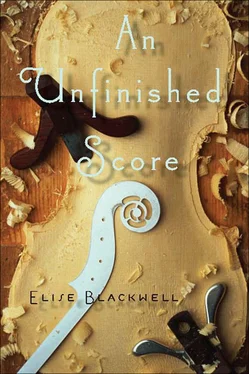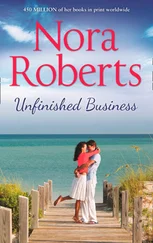“Blindfolded?” Suzanne asks, for Petra.
The doctor nods. “And most have some control over pitch. Again, they may not be able to discern an A from an A sharp in the same octave, but if you play two notes an octave apart, or even considerably closer, almost all of them can tell which is higher.”
“But what’s it like?” Petra asks. “What’s it like for them? Is it like hearing?”
Dr. Ormand shrugs. “I don’t know. I was born hearing. There are some good books, memoirs that I can recommend, but I’m not sure we can ever understand. What I do understand is that these children will have a more normal life than they would have if they hadn’t been implanted.”
“What’s normal?” Petra asks, sounding again like Ben.
The doctor smiles — a professional gesture more than a genuine response. “There’s a philosophy department over at Temple.”
“That one boy,” Suzanne says, “he was humming ‘Frère Jacques.’”
“Again, it takes a lot of therapy and follow-through, not just here but in the home and school, to train the children how to interpret the signals their brains are receiving. But yes, some of them can perceive music and even sing well. That’s likely determined by innate talent underlying the deafness.”
Suzanne asks, “Is it really music to them?”
The doctor shrugs. “There’s probably a music theory department at Temple, too.”
Suzanne does not know how to phrase her question more usefully, to explain that it’s a real question and not, like Petra’s, just an expression of stubbornness.
“There’s work being done in Canada that suggests that maybe ten percent of music can be experienced through the skin, even in people who can’t hear at all. The researchers there designed a special chair that allows the deaf to have an experience of music. Not your experience but an experience. Add an implant, and yes, I would call it hearing music.”
When they stand to leave, the doctor hands Petra what they have come for: a thick stack of pages containing findings that suggest that Adele, if implanted, could talk on the telephone. That she could — more or less and depending on definition — hear.
“On the other hand, I should warn you. In your home country, in Sweden, where good candidates are implanted early and are not allowed to sign in schools, plenty of kids yank out their earpieces as soon as they get home and use sign language. I’ve read your daughter’s evaluation carefully. She’s just a little older than I’d like, but otherwise she’s as good a candidate as they come. But the cochlear is not a panacea. It’s a big decision.”
“I want her to hear me play violin,” Petra whispers. “Is that selfish? When I found out she was deaf, that’s what I hated the most. All the music I played for her while she was inside me — she didn’t hear any of it.” She is crying now. “I want her to be able to do anything, whatever she wants, to be happy.”
The doctor’s face is still — not unsympathetic but dispassionate. Suzanne recognizes the expression from the doctor who told her that her baby would die inside her, handing her a box of tissue but not laying a hand on her shoulder. Dr. Ormand has heard these things before, and it isn’t her job to make parents feel better.
As they walk back down the hall, Suzanne finds that it now smells exactly like a hospital and quickens her pace.
Suzanne drops off Petra downtown and steers south, where her Irish father lives stubbornly among Italians despite the fact that the last Italian willing to give him the time of day divorced him with cause two decades ago. She lets herself into his building and then into his third-floor flat.
He sits in the crooked frame of his window, exposing only a fraction of his profile. At this angle, though, his hand is larger than life. And Suzanne cannot forget that it is this hand that her mother saved her from, rousting her from sleep only days before her ninth Christmas, whispering close to her ear, “Quietly, quickly; come, Suzanne.” Her mother’s lips brushed her ear, and her face smelled clean, like mint. After that night, any time Suzanne spent with her father was counted in hours and not in days, and she understood that this was for the best.
Now his hand has stilled and the many serrated edges of his tricky personality have dulled. Years of heavy drinking have bored holes through his intelligence. As his brain’s nerves and synapses seek passage around these empty plugs to form a coherent story of the world, he revises the past and sees in the present mostly conspiracy and threat, whether from a new wrinkle in the tax code or the transport truck that bears toward his fender as he drives thirty miles per hour on the freeway.
She cannot bear to visit more than a few times a year. Ben never offers to come with her — and she never asks him to — so she always comes alone, with food prepared in a foil casserole pan.
Her mother, after they left that night, became a producer of frozen casseroles. She worked long days all week, in an office during the day and in the evening trying to sell houses in a sliding city, in a city whose residents had yet to discover that they wanted, after all, to live in town. So on the weekends her mother cooked for the week, freezing meals in foil pans for Suzanne to thaw and heat on Monday, Tuesday, Wednesday. As she grew older, Suzanne offered to help, to cook on weeknights. “No,” her mother would say, “your time is for practice.” When her mother died, she left a freezer full of neatly stacked dinners.
Eventually Suzanne ate this posthumous food, not out of nostalgia or tribute but because she was broke and needed to eat. The final meal was an improvised ratatouille stirred with noodles, made from an eggplant gone bitter, so the last taste of her mother was disappointment. Suzanne fell apart crying, wishing she had saved the delicious spinach lasagna or cacciatore for last.
“What are you looking at?” She starts to add the word Dad to the end of her question, but the consonant sticks on her tongue, and the question ends with a small thud.
“The garbage men. All they do is stand there and smoke. Company’s owned by the brother of the guy who owns the building. It’s a racket. My rent money goes to them so they can stand around and puff their Marlboros when all I can afford is generic. One of these days I’m going to do something about it.”
Suzanne nods, but her father’s attention stays trained through the window.
“One of these days I’m going to write a letter to someone. Maybe the newspaper, or that television station. Someone ought to investigate this racket. Maybe I’ll get a petition going around the building.”
“I just came to look in on you.” Suzanne crosses the small efficiency unit and puts the lasagna in the half-sized refrigerator. “I have a friend waiting for me, so I can’t stay.”
“I suppose you’ll want me to wash that pan after I eat.”
“No,” she says, and when he looks at her, she musters a smile. She says what she says every time: “It’s the kind of thing you can throw away if you don’t want to keep it.”
“I know you mean well, but that’s the problem with this country. Everyone thinks you can just throw things away. Pans, paper, marriages, babies.”
She feels a twitch in her ribs. “Well, you can wash and keep the pan if you want, and maybe you’ll like what’s in it. I grew the basil — no cellophane bags involved.”
She waits, but her father sees only the workers who have caught his ire.
“I’ll see you next time,” she says. “Take care of yourself.”
Alex often asked her why she would drive to Philadelphia and back when she could have Chinese food or pizza delivered to her father with a phone call. Yet he understood, as much as anyone could, that her relationship to her childhood is more complicated than that.
Читать дальше












